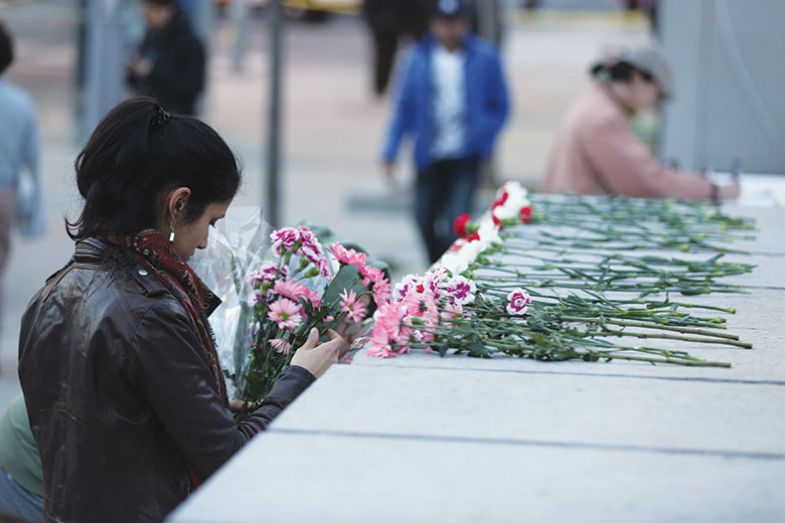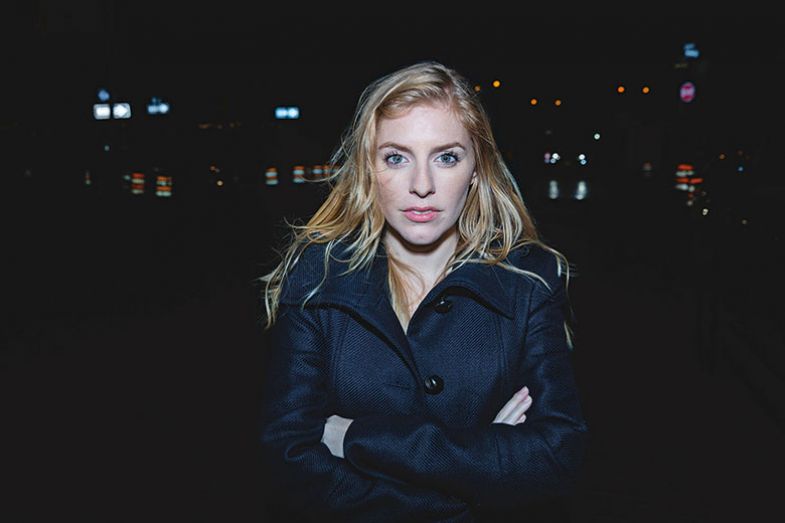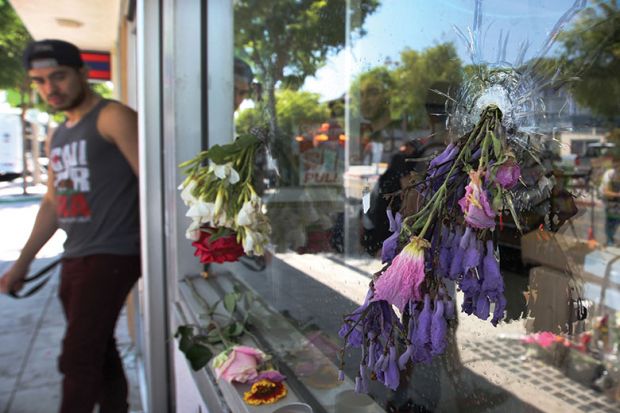The turning point in Kaitlyn Regehr’s career occurred on 6 October 2015 when she was on a bus going towards Acton in West London. The sexual assault she suffered that evening drove her to take the plunge into the dark and deep waters of online misogyny.
“It was a personal experience that had me start to really seriously look at [that] digital space,” recalls Regehr, a lecturer in digital culture at the University of Kent.
She was defended that day by another passenger and the open letter of thanks she posted to him on Facebook went viral. Alongside the 42,000 likes and messages of support were vicious threats and abuse. That led her to “look at both the process of using the digital space as a platform to report sexual violence and the backlash towards me for doing so”.
The incident occurred almost 18 months after a much more serious and high-profile attack. On the evening of 23 May 2014, Elliot Rodger murdered six people and injured 14 others near the campus of the University of California, Santa Barbara – some outside a sorority house – before killing himself.
Just before the attack he uploaded to YouTube a video titled “Elliot Rodger’s Retribution”, explaining that he wanted to punish attractive women for rejecting him and sexually active men because he envied them.
But it was when Alek Minassian drove a van into pedestrians in Regehr’s hometown of Toronto in 2018, killing 10 and injuring 16, that the brutal violence associated with the involuntary celibate (incel) ideology “really hit home” for her.
Minassian had published a Facebook post shortly before the attack which read: “Private (Recruit) Minassian Infantry 00010, wishing to speak to Sgt 4chan please [4chan is an imageboard website that serves as an organising platform for the alt-right]...The Incel Rebellion has already begun! We will overthrow all the Chads and Stacys [generic names for attractive men and women in incel communities]! All hail the Supreme Gentleman Elliot Rodger!”
This proved “deeply upsetting” for Regehr, not least for its “strange echoes” of the Montreal 1989 massacre, which had also targeted women. “Those are among the few high-profile massacres that have ever happened in Canada and they’re both in the name of misogyny.” So after the 2018 attack, the incel movement “became personal for me”.

The word “incel” was coined in the 1990s by a queer woman in Canada, known as Alana, who created a website to discuss her own experience of not having sex and not being in a relationship. But since then the term has been hijacked by a deeply misogynistic online subculture. Some incel forums have recorded up to 40,000 members and advocate sanctioned rape and state-sponsored girlfriends. It is also thought that these communities have become more extremist in recent years, in part due to the influence of alt-right and white supremacist groups.
The bulk of Regehr’s research into this community involved trawling through the disturbing memes and videos published by incels on forums and Facebook groups. She did not meet any face to face, citing both concerns for her safety and issues of access – “I’m not someone who incels want to speak to” – but she was a development consultant on the BBC Three documentary Inside the Secret World of Incels, which was broadcast in July last year. This led to much abuse on Twitter.
“When you are a woman doing this type of research, the dangers are real,” Regehr stresses. “I had definitely experienced backlash online before because of my work, but I hadn’t been scared before…I really noticed how vulnerable female academics are during this project, in that people have an address where to find me.”
Furthermore, consuming the abusive vitriol from incels on forums was hard to take.
“At points I was reading a substantive amount of content that told me that I shouldn’t exist or I definitely shouldn’t have a job and I should be dead and raped and left to rot in the street,” Regehr says. “You can say you’re an intelligent person who is able to give yourself really strong emotional boundaries, but there’s only so much anyone can take. It did get me down.”
As a result, Regehr decided to pace her research: “Anyone consuming [such] content needs to be concerned about their dosage, for their own mental health.”
She also carried out a deep clean of her online presence, deleting Facebook as well as her running apps in case anyone tried to track her, and installing an app that allowed her to create temporary phone numbers for communication with strangers, such as Uber drivers.

Despite claiming that there is “a really aggressive edge to incel ideology” and that the community as a whole is “really problematic”, Regehr is “sympathetic” to the struggles of many individual incels. They are people “who feel isolated, who feel rejected by normative society, who are looking for companionship. These groups are supposedly set up to help them with that and to support that. That, at its core, sounds great,” she says.
Yet, in Regehr’s view, many incels are “falling victim” to a digital age in which images of happy couples are now plastered all over Instagram.
“It’s a shame that the only place that they can find is the incel community, because these are clearly people who are actively looking for belonging,” she adds. After that, unfortunately, “people who have higher levels of indoctrination…move into not just wanting the relationship but being convinced you’ll never get it, which morphs into anger, which morphs into hatred towards women and, in some cases, violence.”
The most disturbing interviewee on the BBC Three documentary is “catfishman”, who poses as a male model on dating apps and then hurls abuse at women when they travel to meet him. Regehr is still worried about the women he meets.
The research has also changed the way that Regehr teaches her students. Her classes, on “social media and participatory culture” and “media and meaning”, now have an increased focus on digital literacy, and she has invited the BBC’s cybercrime and digital forensics expert to give a lecture.
“I get my students to download all their Facebook data in class and look at it,” she explains. “I have to teach them that private messenger is not actually private, and that if you send that naked picture to your boyfriend over private messenger, Facebook will still keep it in a deleted chat.”
Regehr adds that students often come and speak to her privately to discuss personal experiences: “anything from dealing with online abuse to a big thing at the moment, sugaring – exchanging companionship for money or gifts through online platforms. Pastoral care is part of the job, and I think if you’re engaging with these topics you need to have an open-door policy and create safe spaces. You also need to be able to advise students. It would be irresponsible to teach these topics without offering a follow-up discussion.”
Although Regehr notes that it is common for humanities research to just present “a huge set of problems”, the next stage of her own work is going to focus on the classification and policing of incel-based violence in an attempt to find solutions.
She believes that the police and social media companies are not doing enough to monitor alt-right misogynistic content, while the UK education system should be doing more to identify and support vulnerable people and teach digital literacy.
“If you think about the way that religious extremist content is monitored versus alt-right or misogynistic content, there’s such a gulf,” she points out. “That’s because time and time again we look at incel or alt-right attacks as lone wolf attacks instead of looking at a pattern. And there is a pattern – there’s a pattern of people engaging on these [incel] platforms, oftentimes actually saying they’re going to go out and [commit a crime], and then heading out and committing a mass murder. We’ve seen enough attacks now that we need to be worried about the dosage of this content that vulnerable individuals are consuming and how the process works of moving violence off screens and on to streets.”
However, she acknowledges that it is hard to police misogyny when it is so mainstream.
“The funny sexist meme that is put on your cousin’s Facebook wall. Your nerdy nephew who sits playing video games or watching violent porn in his room. All of these behaviours are not that ‘other’,” she says. “Misogyny sits within Western culture. It’s systemic. We need to acknowledge that misogyny is systemic, and...that there is a clear pattern of behaviour.”
She adds that the fact that incel behaviour has “come into popular culture is problematic in that we’re normalising this type of misogyny”. For instance, the online marketplace Redbubble features scores of T-shirts emblazoned with the word “Incel” or other slang words used by the community, while Joaquin Phoenix’s Oscar-winning performance in Todd Phillips’ 2019 film Joker has been described as reminiscent of members of the incel community.
It probably says something about the emotional demands of her area of research that Regehr hasn’t yet seen the film.
“It’s not how I want to spend two hours right now,” she reflects. “I just need a break.”
POSTSCRIPT:
Print headline: The murky world of online misogyny
Register to continue
Why register?
- Registration is free and only takes a moment
- Once registered, you can read 3 articles a month
- Sign up for our newsletter
Subscribe
Or subscribe for unlimited access to:
- Unlimited access to news, views, insights & reviews
- Digital editions
- Digital access to THE’s university and college rankings analysis
Already registered or a current subscriber? Login








